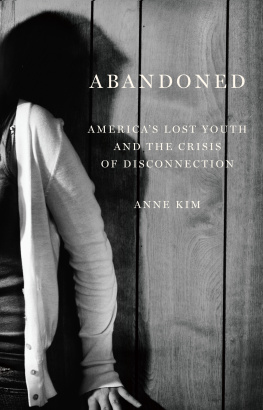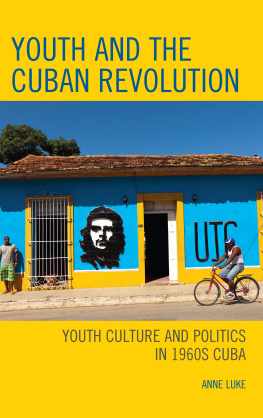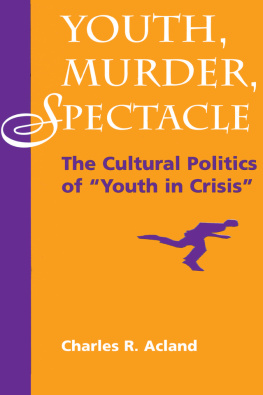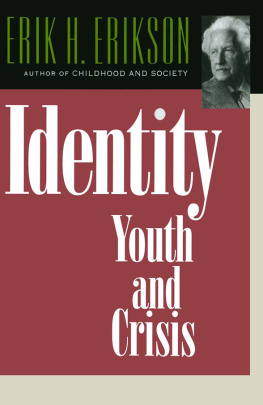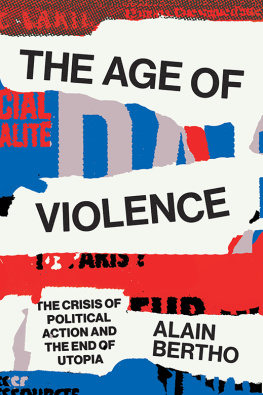Anne Kim - Abandoned: Americas Lost Youth and the Crisis of Disconnection
Here you can read online Anne Kim - Abandoned: Americas Lost Youth and the Crisis of Disconnection full text of the book (entire story) in english for free. Download pdf and epub, get meaning, cover and reviews about this ebook. year: 2019, publisher: The New Press, genre: Politics. Description of the work, (preface) as well as reviews are available. Best literature library LitArk.com created for fans of good reading and offers a wide selection of genres:
Romance novel
Science fiction
Adventure
Detective
Science
History
Home and family
Prose
Art
Politics
Computer
Non-fiction
Religion
Business
Children
Humor
Choose a favorite category and find really read worthwhile books. Enjoy immersion in the world of imagination, feel the emotions of the characters or learn something new for yourself, make an fascinating discovery.
Abandoned: Americas Lost Youth and the Crisis of Disconnection: summary, description and annotation
We offer to read an annotation, description, summary or preface (depends on what the author of the book "Abandoned: Americas Lost Youth and the Crisis of Disconnection" wrote himself). If you haven't found the necessary information about the book — write in the comments, we will try to find it.
Anne Kim: author's other books
Who wrote Abandoned: Americas Lost Youth and the Crisis of Disconnection? Find out the surname, the name of the author of the book and a list of all author's works by series.
Abandoned: Americas Lost Youth and the Crisis of Disconnection — read online for free the complete book (whole text) full work
Below is the text of the book, divided by pages. System saving the place of the last page read, allows you to conveniently read the book "Abandoned: Americas Lost Youth and the Crisis of Disconnection" online for free, without having to search again every time where you left off. Put a bookmark, and you can go to the page where you finished reading at any time.
Font size:
Interval:
Bookmark:

ABANDONED
ABANDONED
Americas Lost Youth and the Crisis of Disconnection
Anne Kim

Contents
ABANDONED
Introduction
In June 2018, a then twenty-eight-year-old former waitress rocked the American political establishment with her surprise defeat of a nine-term veteran congressman in the Democratic primary election in New Yorks 14th Congressional District. Alexandria Ocasio-Cortezs victory over Rep. Joseph Crowley was instantly hailed as the beginning of a tectonic generational shift in the countrys political leadership. Now in her fledgling tenure as one of the youngest members of Congress ever elected, Ocasio-Cortez has been shaping the national debate while challenging old-guard politics.
In the same month as Ocasio-Cortezs first momentous political victory, high school students from Parkland, Florida, survivors of a massacre at Marjorie Stoneman Douglas High School that killed seventeen people, launched a nationwide bus tour to advocate for gun control legislation.
Americas young people are rising. And as young leaders like Ocasio-Cortez and the students from Parkland are proving, their energy and idealism are a transformational force. In technology, culture, the economy, and politics, young adults in both the millennial and post-millennial generations are making their mark as the most diverse, connected, and best-educated populations the
But while Americas young people are risingthey are not all rising together.
A significant share of young people are not keeping up with their peers. Rather, they are disconnected from the mainstream of opportunity and disengaged from education and employment, or are at risk of being so. In 2017, as many as 4.5 million young peopleor a stunning 11.5 percent of young people ages sixteen to twenty-fourwere neither in school nor working, according to the Social Science Research Council. For millions more, their hold on school and work is shaky at best as they struggle to make their way in communities that are left behind or to overcome the personal and family obstacles life has thrown their way.
The young people who ultimately lose their foothold in education and employment are variously known as disconnected youth, opportunity youth, or, as the Europeans call them, NEETsnot in employment, education, or training. Whatever the label, they represent the twin tragedies of societal failure and wasted potential. Their large numbers are moreover a warning sign of deeper underlying challenges that could cut short the potential of these upcoming generations.
For the vast majority of young adults in America, the transition to independence is a time of not only nerve-wracking anxiety but also excitement and possibility. Leaving home. Going to college. A first job. A first apartment. And down the road, perhaps, a partner, marriage, and family.
For most young people, this leap into adulthood is also cushioned by a web of connections to families, teachers, coaches, pastors, and other caring adults who can smooth an often tumultuous transition. Mentors like these provide young adults with advice as well as resourcesemotional, financial, and professionalto navigate challenges and, importantly, help them bounce back from mistakes. Most young people also arrive at the threshold of adulthood armed with an education, emotional resilience, and other assets imparted to them by the village that raised them.
I remember arriving in Washington, D.C., during the mid-1990s at the age of twenty-four, a freshly minted law school graduate ready to start the first real job of my career. I was terrified of failure. But I also had enormous advantages in my favor, which I took for granted at the time. Despite a high five-figure student debt, I had a car, a credit card, and some money in the bank. As scared as I was of my new bosses, Id had internships and summer jobs that had taught me how to behave (more or less) in a professional environment. And while my home life was far from perfect, I knew I could find refuge with my mom in Kansas City, Missouri, if my life completely cratered. As precarious as my professional, emotional, and financial situation seemed to me then, I had a net below me in case the ladder broke or I slipped.
The importance of these kinds of supports has only grown as the runway to independence has become more protracted and fraught with obstacles earlier generations didnt face. Young people today must invest more time in school than they once did if they want a job that pays a living wage. Escalating housing prices in many parts of the country mean that young adults often cant afford to live on their own with an entry-level salary. As one result, parental support now plays a larger and longer role in many young peoples lives than it did in generations past. Middle-class parents increasingly recognize that their childrens young-adult years are a chance to cement the advantages that will carry them through their adult lives. Thats why they save for college, help their children find internships, and often welcome them back home before their final launch into independence. In 2015, as many as one in three young people ages eighteen to thirty-four were living at home with their parents, according to the U.S. Census Bureau.
But many young peopleespecially those who are lower incomedo not have the benefit of this extended support. For them, their entry into adulthood is not so much a guided journey into independence as an abrupt abandonment.
Rochelle is one such young person whose journey into adulthood has been rocky. When I met Rochelle in the spring of 2018, she was twenty-three years old and had just enrolled in a program at CASES, a nonprofit offering education and job training and alternatives to incarceration for both youthful and adult offenders in New York City. She had brought her three-year-old daughter, Egypt, who was outfitted in pink from head to toe. We punctuated our conversation with I Spy breaks for the three of us out the window of CASES offices on Adam Clayton Powell Boulevard in Harlem, Manhattan. We saw green double-decker tourist buses and the red marquee of the historic Apollo Theater, just a few blocks down the street.
Rochelle had come to CASES to finish her education and find a job. I want to study as hard as I can, obtain my GED, and eventually move out of the shelter to my own apartment, she said.
Her prospects, however, were tenuous, despite her ambitions. At the time we spoke, Rochelle and Egypt had just moved into a nearby shelter for homeless families after six months in another shelter for victims of domestic violence. Her older sister and the aunt who had raised her were back in the Bronx, her aunt working the night shift as a housekeeper while her sister worked in security.
Rochelle had also just lost her most recent job, at a drugstore, when her bosses refused to give her time off for a mandatory appointment with her welfare caseworker. Not wanting to risk losing her benefits, she went to her appointment anyway. She was fired. I had that job eight months, she said. Thats the longest I kept a job.
As extreme as her circumstances seem to be, Rochelles story is all too common. America is facing a crisis among its young adultsone that public policy is woefully neglecting.
Millions of young people are navigating communities where poverty is endemic, jobs are scarce, and opportunities weak, with parents and peers struggling just as much as they are to keep themselves afloat. Some have been pushed out by the institutions charged with their well-beingsuch as schools and the child welfare systemwithout adequate skills, education, or resources. Others have lost their parents to the ravages of substance abuse or domestic violence or to the maw of the criminal justice system. Some have been incarcerated themselves and then spit back out onto the street. Often, the systems and institutions that are supposed to help these young people have instead sabotaged their chances of success, exacerbating the hardships they already face.
Next pageFont size:
Interval:
Bookmark:
Similar books «Abandoned: Americas Lost Youth and the Crisis of Disconnection»
Look at similar books to Abandoned: Americas Lost Youth and the Crisis of Disconnection. We have selected literature similar in name and meaning in the hope of providing readers with more options to find new, interesting, not yet read works.
Discussion, reviews of the book Abandoned: Americas Lost Youth and the Crisis of Disconnection and just readers' own opinions. Leave your comments, write what you think about the work, its meaning or the main characters. Specify what exactly you liked and what you didn't like, and why you think so.

